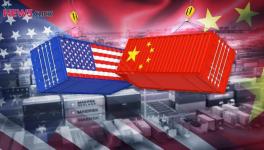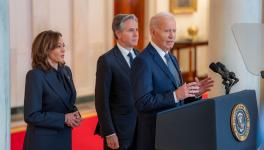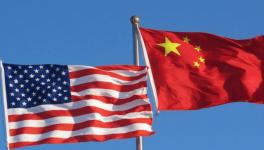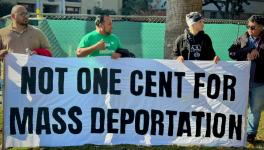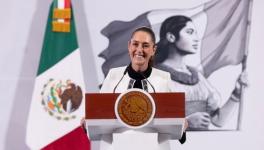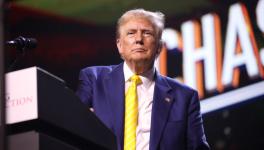Russiagate is Dangerous, Will Washington Get the Memo?
Stephen F. Cohen is professor emeritus of Russian studies, history, and politics at New York University and Princeton University. A Nation contributing editor, his recent book, Soviet Fates and Lost Alternatives: From Stalinism to the New Cold War, is available in paperback from Columbia University Press.
Transcript
AARON MATÉ: It's The Real News, I'm Aaron Maté. There are many issues for Democrats and Republicans to fight about. But right now, the biggest fault line in Washington, D.C. is a memo. President Trump is reportedly set to release a controversial Congressional memo written by Republicans that alleges surveillance abuses by the FBI, and their handling of the Russia probe. Democrats and top FBI officials opposed the memo's release, warning it could compromise intelligence methods and national security. The fight over the memo is the latest in the heavily partisan climate surrounding Russiagate.
Joining me to discuss is Stephen F. Cohen, professor emeritus of Russian studies, history and politics at NYU and Princeton University. His books include Soviet Fates and Lost Alternatives: From Stalinism to the New Cold War.
Professor Cohen, welcome. I want to start with a clip from MSNBC. This is analyst John Heilemann speaking to Senator Chris Murphy. He's talking about Devin Nunes of the House Intelligence Committee, the author of this memo that is the subject of so much acrimony right now. This is what Heilemann had to say about Nunes:
JOHN HEILEMANN: Senator, it's John Heilemann here. I want to ask you a question that under almost any other circumstances would be ridiculous and absurd, but under these circumstances, I think is actually warranted. Is it possible that the Republican chairman of the House Intel Committee has been compromised by the Russians? Is it possible that we actually have a Russian agent running the House Intel Committee on the Republican side?
CHRIS MURPHY: I hope that's not the case. I certainly have no information to suggest that it is. I think that there are
JOHN HEILEMANN: Doesn't his behavior speak of that though? I mean, I'm not the first person who's raised this. He's behaving like someone who's been compromised. There are people in the intelligence community and others with great expertise in this area who look at him and say, "That guy has been compromised."
AARON MATÉ: That is John Heilemann of MSNBC speaking to Democratic Senator Chris Murphy.
Professor Cohen, I know you've been astounded by the Russiagate spectacle so far. But did you ever think that we'd be seeing on national TV an analyst asked if a Congress member is a Russian agent?
STEPHEN COHEN: Why not? They're accusing the President of the United States of being a Russian agent. I mean, think about it. This has never happened in American history. However much you may loathe Trump, this is a whole new realm of defamation. You asked me if I'm astonished by this. I'm shocked, but I'm not astonished because I have thought and said for a number of years that there's been a steady degradation of American political culture and discourse, generally. There was a time when I hoped or thought that it would be the Democratic Party that would push against that degradation.
Now, however, though I'm kind of only nominally, a Democrat, now, however, it's the Democratic Party that's degrading our political culture and our discourse. So, this is MSNBC, which purports to be not only the network of the Democratic Party, but the network of the progressive wing of the Democratic Party, is now actually because this guy was a semi-anchor was asking the question to an American senator, "Do you think that Representative Nunes, because he wants the memo released, has been compromised by the Kremlin?"
This is where it's sunk to in a way, Aaron, I think all of us, maybe more your generation than mine, need to focus on what's happened in this country when in the very mainstream, I mean at the highest, most influential levels of the political establishment, this kind of discourse is no longer considered an exception. It is the norm. We hear it daily from MSNBC and CNN, from the New York Times and the Washington Post, that people who doubt the narrative of what's loosely called Russiagate are somehow acting on behalf of or under the spell of the Kremlin, that we aren't Americans any longer.
And by the way, if people will say, "Well, it's a weak capitulation of McCarthyism," I say no, it's much more than that. It's much more than that because McCarthy was obsessed with communist. That was a much narrower concept than being obsessed with anybody who might be under Russian influence of any kind. The so-called affinity for Russia. Well, I have a profound affinity for Russian culture and for Russian history. I study it all the time. This is something new. And so when you accuse a Republican or any congressman of being a Kremlin agent, this has become a commonplace. We are degraded.
AARON MATÉ: There is a report put out recently by the very influential Council on Foreign Relations. And they echo something you've been saying for a long time. They say the US is currently in a second cold war with Russia. Now, they arrived to different conclusions that you do, and call for an even more aggressive policy towards Russia than we have already. But I'm wondering what you think the aims there are of people from an establishment group like this. I mean, this is the cream of the crop when it comes to the US foreign policy establishment, pushing now for ramping up the confrontation with Russia.
STEPHEN COHEN: Well, for many years, the people who ran the council denied we were in a new Cold War. When I was arguing that, they said I was wrong. I think partly because they don't understand what Cold War is. But mainly because of their own complicity in the policy making. You have to understand, if you don't or your viewers don't, what is the council on foreign relations? It's not just a think tank.
By the way, I posted an article on exactly what we're discussing at The Nation last week. The council is and has been for almost 100 years, certainly 50 years, the single most influential non-governmental center of foreign policy influence. What it's done over the years because of its elite membership, is shaped essentially the parameters of mainstream discussion, what's culture and what isn't culture. It didn't do a bad job during the last Cold War. But now, it's published the report saying we're in second Cold War with Russia. That's correct, assuming the first one really ended. Of course, they blame it entirely on Russia. And therefore, they have what they call a list of recommendations that probably would lead the Hot War.
I wasn't surprised, but I was sufficiently aggrieved that I sent a letter of resignation because I've been a member since the 1970s. But nothing will change their course. They don't debate it. But they are a reflection of where we're at in this country in terms of our political establishment because as much as the council influences the political establishment, if like the New York Times, for example, mirrors what's permissible, what's being thought within the political establishment. It's a new Cold War, and I won't reiterate what I said to you last time we were on, but for various reasons, I assure you, this new Cold War is much more dangerous, much more likely to end in Hot War, was then was the 40-year of Cold War, which we barely survived.
AARON MATÉ: All right. So, in terms of how that is playing out on the front lines, away from all of the focus on Russiagate, away from talk about Nunes memo, and the dossier, and Carter Page and all of the characters that comprise Russiagate, what are the most worrying developments to you that are happening between the US and Russia as a source of tension that you think are being overshadowed? And let me just read you one line. This is from Trump's new national defense strategy. It declares that the US Military advantage over Russia, and also China, is eroding. Unveiling it, the Defense Secretary James Mattis said, "Great power competition, not terrorism, is now the primary focus of US national security." This did not give our much attention. I'm wondering your thoughts on it, especially in the context of worsening relations with Russia.
STEPHEN COHEN: Well, Mattis will presumably have to explain that when, eventually, as I fear they will, international terrorists blow an American subway, or an American sports arena as they've doing across Europe and Russia for years. That's simply in myopic point of view of what's been happening during the last 20 years. And I don't know what to say except its fundamentally wrong. It's basically anti-Russian. So, they de-escalate the importance of terrorism. They get there, whoa, nobody wants to give Trump any credit, but in his State of the Union speech, the only thing he said about Russia is that it's a rival. He didn't say it's an enemy. He didn't say it's a threat. He said it's a rival. That's absolutely true. He was not down with his generals during the State of the Union speech.
What's the most worrying thing? That the new Cold War is unfolding not far away from Russia, like the last in Berlin, but on Russia's borders in the Baltic and in Ukraine. That we are building up our military presence there, so the Russians are counter-building up, though within their territory. That means the chances of hot war are now much greater than they were before. Meanwhile, not only do we not have a discussion of these real dangers in the United States but anyone who wants to incite a discussion, including the President of the United States, is called treasonous.
I mean, every time Trump has tried with Putin to reach a cooperative arrangement, for example, on fighting terrorism in Syria, which is a worthy purpose, a necessary purpose, literally, the New York Times and the others call him treasonous. Whereas, in the old days, the old Cold War, we had a robust discussion. There is none here. We have no alert system that's warning the American people and its representatives how dangerous this is. And as we mentioned before, I mean, it's not only Nunes, it's a lot of people who are being called Kremlin agents because they want to digress from the basic narrative.
Meanwhile, I would add because it's not reported here, that people in Moscow who formed their political establishment, who surround Putin and the Kremlin, I mean, the big brains who are formed policy tankers, and who have always tended to be kind of pro-American, and very moderate, have simply come to the conclusion that war is coming. They can't think of a single thing to tell the Kremlin to offset hawkish views in the Kremlin. Every day, I mean, this list of oligarchs and the rest. Every day, there's something new. And these were the people in Moscow who are daytime peacekeeping interlockers. They have been destroyed by Russiagate. Their influence as Russia is zilch. And the McCarthyites in Russia, they have various terms, now called the pro-American lobby in Russia... This is the damage that's been done. There's never been anything like this in my lifetime.
AARON MATÉ: Professor Stephen F. Cohen, professor emeritus of Russian studies, history and politics at New York University and Princeton University. His books include Soviet Fates and Lost Alternatives: From Stalinism to the New Cold War. Professor Cohen, thank you.
STEPHEN COHEN: And Aaron, thanks to you.
AARON MATÉ: Thank you for joining us on The Real News.
Disclaimer: The views expressed here are the author's personal views, and do not necessarily represent the views of Newsclick.
Get the latest reports & analysis with people's perspective on Protests, movements & deep analytical videos, discussions of the current affairs in your Telegram app. Subscribe to NewsClick's Telegram channel & get Real-Time updates on stories, as they get published on our website.










